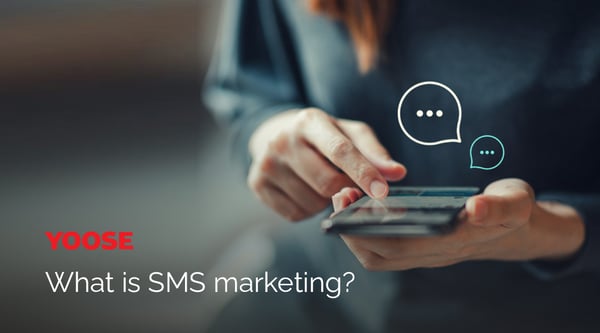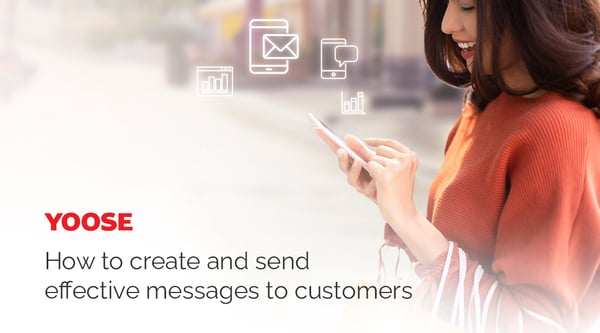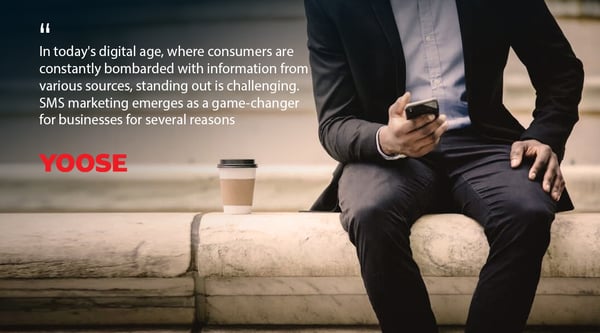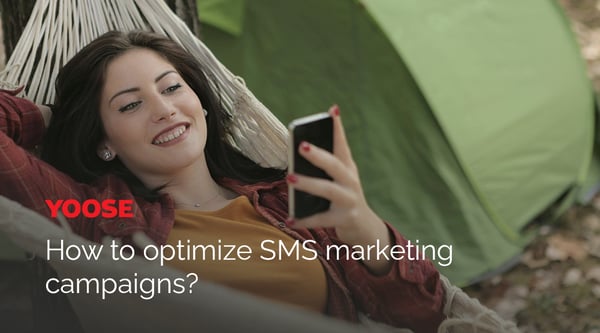SMS Marketing: How to Grow Your Business with Text Messages
SMS marketing is a powerful way to connect with your customers and prospects. It allows you to send personalized, timely and relevant messages that can boost engagement, loyalty and sales.
But what is SMS marketing exactly? In this blog post, we will answer these questions and more. We will also share some examples of successful SMS marketing campaigns from different industries.
What is SMS marketing?
SMS marketing, also known as Short Message Service marketing, is the practice of sending transactional or promotional messages via text. Marketers can use it to send discounts, personalized offers, surveys, reminders and more to people who have consented to receive text communications from their business.

SMS marketing is an owned marketing channel, meaning that businesses can control the distribution list of numbers and the content of the messages. It is also a direct and personal way to communicate with customers, as most people keep their phones close and check their messages frequently.
How to create and send effective messages to customers
To start an SMS marketing campaign, you need to obtain consent from your customers or prospects. This means that they have to opt-in to receive your messages, either by texting a keyword to a short code (a five- or six-digit number) or by filling out a form online.
Once you have a list of subscribers, you can use an SMS marketing software or platform to create and send your messages. You can also segment your list based on different criteria, such as location, purchase history or preferences, to send more targeted and relevant messages.

There are many types of SMS marketing messages that you can send, depending on your goals and audience. Some of the most common ones are:
Welcome messages: These are the first messages that you send to new subscribers, thanking them for joining your list and setting their expectations for future communications.
Flash sale messages: These are messages that announce a limited-time offer or discount, creating a sense of urgency and encouraging customers to act fast.
Back-in-stock messages: These are messages that inform customers when a product that they were interested in is available again, prompting them to complete their purchase.
Hype-up messages: These are messages that build anticipation and excitement for an upcoming event, product launch or promotion.
Feedback messages: These are messages that ask customers for their opinions or ratings on your products or services, helping you improve your customer satisfaction and loyalty.
Giveaway messages: These are messages that invite customers to participate in a contest or sweepstakes, rewarding them for their engagement and loyalty.
Cross-sell/upsell messages: These are messages that suggest additional or complementary products or services to customers who have already made a purchase, increasing your average order value and customer lifetime value.
Why is SMS Marketing important?
In today's digital age, where consumers are constantly bombarded with information from various sources, standing out is challenging. SMS marketing emerges as a game-changer for businesses for several reasons:
High Open Rates: SMS boasts one of the highest open rates among all marketing channels. Statistically, over 90% of text messages are read within the first three minutes of receipt. This guarantees visibility for your message, ensuring that your audience will likely read what you send them.
Direct and Personal: Text messages offer a direct line of communication to the customer. Unlike emails, which can end up in spam, or social media ads, which can be lost in the feed, SMS lands straight in a personal space – the recipient's mobile phone.
Immediate Impact: Due to the instantaneous nature of SMS, businesses can drive urgent actions, such as promoting flash sales or last-minute reminders, achieving immediate responses from their target audience.

Cost-effective: Compared to traditional advertising or even certain digital marketing campaigns, SMS marketing is often more budget-friendly. This makes it an accessible channel for businesses of all sizes.
Opt-in Nature Ensures Quality Audience: Since SMS marketing requires customers' consent, the audience you're communicating with has already expressed interest in your brand or services. This means your messages are directed towards a more receptive and potentially loyal group.
Enhanced Customer Experience: SMS can be used for transactional messages, appointment reminders, or feedback requests, enhancing the overall customer experience. It's not just about promotions; it's about adding value.
Easily Integratable with Other Marketing Efforts: SMS can seamlessly fit into any marketing mix. It can amplify the effects of a social media campaign, reinforce an email message, or act as a follow-up to an in-person event.

Challenges
Limited text space: SMS messages are limited to 160 characters, which requires concise and clear language. It can be difficult to convey the value proposition and the call to action in such a short message.
Security concerns: SMS messages come from nondescript five- or six-digit numbers, which can make customers wary of their authenticity and safety. Customers may not trust messages that ask for personal or financial information or that contain links to unknown websites.
Opt-in process: SMS marketing requires customers to give their consent before receiving messages, which can be challenging to obtain and maintain. Customers may not be aware of how to opt-in or opt-out, or they may change their preferences over time.

Higher unsubscribe rates: SMS messages can be perceived as intrusive and annoying by some customers, especially if they are sent too frequently or at inappropriate times. Customers may opt-out of SMS messages if they feel they are not relevant, valuable, or respectful of their privacy.
SMS marketing regulations: SMS marketing is subject to various laws and regulations that vary by country and region. Marketers need to comply with these rules to avoid fines, lawsuits, or damage to their reputation. Some of the common requirements are obtaining consent, providing opt-out options, disclosing the sender's identity, and respecting the do-not-call lists.
How to optimize SMS marketing campaigns?
To make the most out of your SMS marketing campaigns, you should follow some best practices that will help you optimize your results and avoid any legal issues. Here are some of them:
Permission is key: You should always get explicit consent from your customers before sending them any SMS marketing messages. This will help you comply with the laws and regulations in your country or region, as well as build trust and respect with your audience.
Simplify your offer: People like easy things and avoid thinking too much. If you give them too many options, they will do nothing. So if you have a lot of items on sale, just send one SMS for one item. You can show them more items when they come to your store.
Attract your SMS recipients: That means you need to give them interesting and appealing information. Reward them for responding to the SMS: for example, a prize for the first 100 people who show up, 30% off for anyone who brings their spouse and shows the SMS. You can experiment with different methods and see what works best for your business. The main rule is to answer the question that people always have: what’s in it for me? That also makes messages spread.

Be punctual: Don’t send messages too late or too early. It’s irritating. Also, don’t send messages about events that have already passed.
Make your SMS campaign urgent: We tend to delay things and forget them soon. Try to make your message compelling and prevent customers from ignoring it - have a deadline or limited stock. For instance, tell them you only have 1000 pieces left and it’s first come, first served. This way encourages fast actions.
Don’t send vague messages: It’s better to send a long one that tells a whole story than a short one that says nothing. Answer the question: What? When? How? Why? Because that’s what your readers want to know. Also, don’t tell them to look for more details elsewhere - that lowers response rates. The better thing is to send a SMS that has information like this: ‘In today’s magazine there is information on page 13 about the new collection of your favourite brand’.
Conclusion
SMS marketing is a powerful and cost-effective way to reach your customers and prospects. It allows you to communicate with them in a personal and timely manner, and to deliver relevant and engaging messages that drive action. Whether you want to promote your products or services, increase brand awareness, generate leads, or boost loyalty, SMS marketing can help you achieve your goals.
At YOOSE, we know how to optimize your SMS marketing campaigns so you can enjoy the benefits of this versatile marketing channel. And check out here for more information about SMS marketing and mobile marketing.


